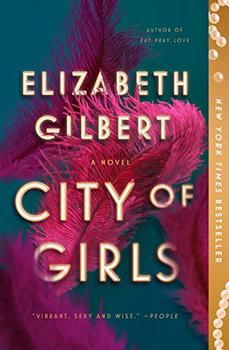Summary | Excerpt | Reading Guide | Reviews | Beyond the Book | Readalikes | Genres & Themes | Author Bio

A Novel
by Elizabeth Gilbert
My mother had no idea what to do with me. We didn't have the closest relationship even under the best of circumstances. She was a keen horsewoman, and given that I was neither a horse nor fascinated by horses, we'd never had much to talk about. Now I'd embarrassed her so severely with my failure that she could scarcely stand the sight of me. In contrast to me, my mother had performed quite well at Vassar College, thank you very much. (Class of 1915. History and French.) Her legacy-as well as her generous yearly donations-had secured my admission to that hallowed institution, and now look at me. Whenever she passed me in the hallways of our house, she would nod at me like a career diplomat. Polite, but chilly.
My father didn't know what to do with me, either, though he was busy running his hematite mine and didn't overly concern himself with the problem of his daughter. I had disappointed him, true, but he had bigger worries. He was an industrialist and an isolationist, and the escalating war in Europe was spooking him about the future of his business. So I suppose he was distracted with all that.
As for my older brother, Walter, he was off doing great things at Princeton, and giving no thought to me, other than to disapprove of my irresponsible behavior. Walter had never done an irresponsible thing in his life. He'd been so respected by his peers back in boarding school that his nickname had been-and I am not making this up-the Ambassador. He was now studying engineering because he wanted to build infrastructure that would help people around the world. (Add it to my catalogue of sins that I, by contrast, was not quite sure I even knew what the word "infrastructure" meant.) Although Walter and I were close in age-separated by a mere two years-we had not been playmates since we were quite little. My brother had put away his childish things when he was about nine years old, and among those childish things was me. I wasn't part of his life, and I knew it.
My own friends were moving forward with their lives, too. They were heading off to college, work, marriage, and adulthood-all subjects that I had no interest in or understanding of. So there was nobody around to care about me or entertain me. I was bored and listless. My boredom felt like hunger pains. I spent the first two weeks of June hitting a tennis ball against the side of our garage while whistling "Little Brown Jug" again and again, until finally my parents got sick of me and shipped me off to live with my aunt in the city, and honestly, who could blame them?
Sure, they might have worried that New York would turn me into a communist or a dope fiend, but anything had to be better than listening to your daughter bounce a tennis ball against a wall for the rest of eternity.
So that's how I came to the city, Angela, and that's where it all began.
They sent me to New York on the train-and what a terrific train it was, too. The Empire State Express, straight out of Utica. A gleaming, chrome, delinquent-daughter delivery device. I said my polite farewells to Mother and Dad, and handed my baggage over to a Red Cap, which made me feel important. I sat in the diner car for the whole ride, sipping malted milk, eating pears in syrup, smoking cigarettes, and paging through magazines. I knew I was being banished, but still ... in style!
Trains were so much better back then, Angela.
I promise that I will try my best in these pages not to go on and on about how much better everything was back in my day. I always hated hearing old people yammering on like this when I was young. (Nobody cares! Nobody cares about your Golden Age, you blathering goat!) And I do want to assure you: I'm aware that many things were not better in the 1940s. Underarm deodorants and air-conditioning were woefully inadequate, for instance, so everybody stank like crazy, especially in the summer, and also we had Hitler. But trains were unquestionably better back then. When was the last time you got to enjoy a malted milk and a cigarette on a train?
Excerpted from City of Girls by Elizabeth Gilbert. Copyright © 2019 by Elizabeth Gilbert. Excerpted by permission of Riverhead Books. All rights reserved. No part of this excerpt may be reproduced or reprinted without permission in writing from the publisher.
At times, our own light goes out, and is rekindled by a spark from another person.
Click Here to find out who said this, as well as discovering other famous literary quotes!
Your guide toexceptional books
BookBrowse seeks out and recommends the best in contemporary fiction and nonfiction—books that not only engage and entertain but also deepen our understanding of ourselves and the world around us.